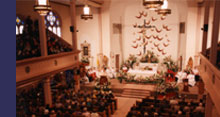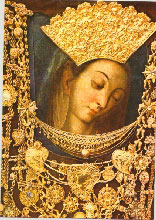 Mention
the word Croatian, to anyone in Chicago, and the next thing they'll
say is Velika Gospa. Truly, Velika Gospa and being Croatian go
hand and hand. Velika Gospa (August 15th) is to Croatians what
St. Patrick's day is to the Irish or Columbus day is to the Italians.
Mention
the word Croatian, to anyone in Chicago, and the next thing they'll
say is Velika Gospa. Truly, Velika Gospa and being Croatian go
hand and hand. Velika Gospa (August 15th) is to Croatians what
St. Patrick's day is to the Irish or Columbus day is to the Italians.
The tradition
of Velika Gospa originated in the town of Sinj, a Dalmatian province
in Croatia. History tells us that in the year 1715, the barbaric
armies of the Turkish empire were advancing toward the town of
Sinj. Their plan was to capture Sinj and to press forward. In
time the Turks hoped to besiege Vienna and ultimately to conquer
all of Europe. The people of Sinj fearing certain annihilation
in face of overwhelming odds, implored the intervention of the
Blessed Mother. In their church, throughout the night of August
14th, they prayed before the portrait of the Virgin Mary then
called "Our Lady of Grace." The following morning, (Assumption
Day) August 15th, an apparition of a beautiful lady appeared in
the sky which everyone recognized as the Blessed Virgin Mary.
The Turkish soldiers became violently ill, they were unable to
cross the river to Sinj and thus retreated. Thru Our Lady of Sinj's
miraculous intervention the attack was repulsed and the powerful
armies of the Turkish empire were in flight. The Turks never returned
to Sinj.
In gratitude
for so great a victory, against so superior a force, the Croatians
increased their love and devotion to Our Lady. The people attributed
this miracle to the Lady of Sinj and drapped gifts of gold upon
her beloved image as proof of her help and the peoples confidence
in her. They rebuilt a larger church and it became the outstanding
Marian shrine for all of Dalmatia.
For more than
200 years the Croatians have maintained a special love and devotion
to Mary. To this day, thousands of pilgrims, especially from Dalmatia
and Bosnia, make the annual pilgrimage to the church in Sinj.
They come to ask for help in their hour of need, to give thanks
for favors received and to honor the Virgin Mary.
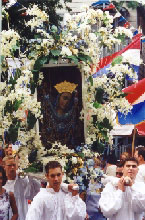 Around
the early 1900's, Croatians started setteling in the Bridgeport
Area. By 1910 they numbered almost 5000. Most of the new arrivals
were from Dalmatia, many from the area close to the town of Sinj.
In 1906, a small group of men gathered and formed a fraternal
society for social and cultural purposes. The name was to be:
The Dalmatian Family Society of the Miraculous Lady of Sinj. The
society provided its members with badly needed health insurance
and death benefits. The society, became a place for new immigrants
to bond. Within a few years the society's membership grew to over
600.
Around
the early 1900's, Croatians started setteling in the Bridgeport
Area. By 1910 they numbered almost 5000. Most of the new arrivals
were from Dalmatia, many from the area close to the town of Sinj.
In 1906, a small group of men gathered and formed a fraternal
society for social and cultural purposes. The name was to be:
The Dalmatian Family Society of the Miraculous Lady of Sinj. The
society provided its members with badly needed health insurance
and death benefits. The society, became a place for new immigrants
to bond. Within a few years the society's membership grew to over
600.
The year 1912
saw the blessing of a new parish for Bridgeport. St. Jerome Croatian
Parish opened its doors. It quickly became the home to the 600
plus members of Gospa Sinjska Society. It was at this time that
the Bradarich Brothers brought to St. Jerome's a copy of the icon
of Our Lady of Sinj. In the church, a side altar was built and
dedicated to her honor. How happy were the Croatian people to
once more pray before the image they had venerated in their homeland!
Now, having
a church and the replica of Our Lady of Sinj, it was decided to
follow tradition. As in Europe, a procession with the image of
Our Lady carried through the streets was to take place on August
15th. The first Velika Gospa procession was on August 15th, 1913.
The Procession started at 9:00 AM from Germania Hall to St. Jerome
Church for a Solemn High Mass. All society members participated
in the march. Members not attending the August 15th procession
were fined $2.00. Three flags were carried, flowers were purchased
for each man's lapel and a band was hired to lead the procession.
After the Mass, there was a banquet with entertainment and dancing
until midnight.
Within a few
years other societies joined in the Velika Gospa procession. Among
them were: St. George, patron of Poljica C.C.U., St. Jerome C.C.U.,
St. Jerome Holy Name Society, Our Lady of the Rosary C.F.U., young
Ladies Sodality, St. Mary of Cres, St. Anthony C.C.U. and St.
Theresa Altar and Rosary Society.
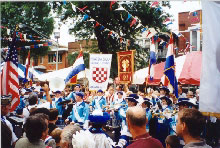 In
keeping with tradition, as in Croatia, after the procession and
participation in the High Mass there come festivity in the form
of a parish picnic. The original picnics were held in the church
grove behind the church hall and on 28th place. Velika Gospa became
synonymous with barbecued lamb and other Croatian delicacies.
In the 1950's the men of the parish roasted as many as a 100 lambs.
People came from all over Chicago to purchase this lamb, often
waiting hours in line. The men of the parish worked through the
entire night so the lamb would be ready to sell by 8 AM. Along
with the lamb, came the sale of Croatian food and pastries. These
were prepared by the women of the Altar and Rosary Society. These
women cooked for an entire week at the church hall in preparation
for the feast. With the mostaccioli, rizot, sarma, beef and chicken
dinners ready, they began work on the fresh pastries. They turned
out numerous strudels, poviticas (walnut cakes) and hundreds of
fritula. The only time away from the kitchen was while walking
in the procession and attending mass. Most of these original immigrant
Croatian women came from small remote villages and were unskilled
in the art of baking delicate pastries. It was Mary Mandich, the
president of the Altar and Rosary Society, who organized these
women and taught them the skills needed to bake strudels and poviticas.
For over 75 years, these ladies handled the preparation of the
dinners and pastries for this famous feast.
In
keeping with tradition, as in Croatia, after the procession and
participation in the High Mass there come festivity in the form
of a parish picnic. The original picnics were held in the church
grove behind the church hall and on 28th place. Velika Gospa became
synonymous with barbecued lamb and other Croatian delicacies.
In the 1950's the men of the parish roasted as many as a 100 lambs.
People came from all over Chicago to purchase this lamb, often
waiting hours in line. The men of the parish worked through the
entire night so the lamb would be ready to sell by 8 AM. Along
with the lamb, came the sale of Croatian food and pastries. These
were prepared by the women of the Altar and Rosary Society. These
women cooked for an entire week at the church hall in preparation
for the feast. With the mostaccioli, rizot, sarma, beef and chicken
dinners ready, they began work on the fresh pastries. They turned
out numerous strudels, poviticas (walnut cakes) and hundreds of
fritula. The only time away from the kitchen was while walking
in the procession and attending mass. Most of these original immigrant
Croatian women came from small remote villages and were unskilled
in the art of baking delicate pastries. It was Mary Mandich, the
president of the Altar and Rosary Society, who organized these
women and taught them the skills needed to bake strudels and poviticas.
For over 75 years, these ladies handled the preparation of the
dinners and pastries for this famous feast.
The largest
attendance for Velika Gospa was in 1954. The Holy Father proclaimed
1954 a Marian Year. Because Velika Gospa was venerated and celebrated
at St. Jerome with such devotion and splendor, Croatians from
all over the midwest came on the pilgrimage to Chicago. Groups
of pilgrims from the following churches attended: St. Mary's Rankin,
Pa., Sacred Heart, South Chicago, Il., St. Nicholas, Pittsburg,
Pa., St. Joseph's, St. Louis, Mo., St. Nicholas, Millvale, Pa.,
St. Joseph the Worker, Gary, Ind., Holy Trinity, Chicago, Il.,
Holy Trinity, Ambridge, Pa., and Sacred Heart, Milwaukee, Wis..
These parishes, along with various societies and parishoners of
St. Jerome made this the largest and grandest Velika Gospa to
date. At 5:00 PM, a Croatian Marian Congress was held on the parish
picnic grounds. The Format of the Marian Congress was:
Marijanski Hrvatski Kongress
Croatian
Marian Congress
5:00
P.M. - St. Jerome Picnic Grounds
Welcoming Address - Rev. Ferdinand Skoko
American
and Croatian Anthems
Miss
Catherine Tomijanovic
Master
of Ceremonies - Rev. Francis Cuturic
Zdravo
Marijo - Zbor Preradovic
Molitva
pred Majkom Bozjom - Mary Flasch
MARIJINA
SVETISTA U
HRVATSKOJ
DOMOVINI PRETSTAVIJAJU
Uvod
- Dario Sarcos
Dalmacija
- Mildred Sutalo
Istra
s Primorje - Mary Jukic
Hercegovina
- Mary Nagy
Bosna
- Mary Sarcos
Slavonija
- Grace Perovic
Srijem,
Banat, Backat - Berardine Krivicic
Lika
- Mary Krivicic
Hrvatska
Banovina - Rosa Sep
Zakljucak
- Alojsije Jukic
Hrvati
Pjevaju Hvalospjev Majci Bozjoj - Katice Vrdoljak
Duhovni
Vjencic Cvijeca na cast bezgrjesnog zaceca - May Huber
Zdravo
Djevo - Pjeva Zbor Djece
TRIBUTE
TO MARY
Djevice
Nevina - Pj. Zbor Harmony
O
Pruzi Mile Ruke - Pj. Zbor Harmony
Marijo,
Ti Mila Majcice - PJ. Zbor Harmony
Address
and Prayer - Msgr. John Juricek
Ave
Maria - Pj. Zbor Hrv. Sloga
K
Suncem Prosi vsaka Roza - Pj. Zbor Hrv. Sloga
Hrvatski
Pjevacki Zborovi Zavrsuju s Narodnim pjesma.
Mali
Brodic - Pj. Zbor Preradovic
Hrvatski
Pozdrav - Pj. Zbor Harmony
God
Bless America - Combined Croatian Singing Socities
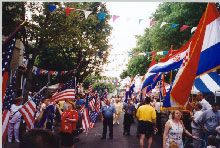 His
Eminence, Samuel Cardinal Stritch welcomed the Croatian Congress,
its pilgrims, and the parishioners and friends of St. Jerome.
He preached of the deep love and devotion to Mary by the Croatian
people. He told how deeply touched he was by the beautiful and
lasting customs celebrated on Velika Gospa.
His
Eminence, Samuel Cardinal Stritch welcomed the Croatian Congress,
its pilgrims, and the parishioners and friends of St. Jerome.
He preached of the deep love and devotion to Mary by the Croatian
people. He told how deeply touched he was by the beautiful and
lasting customs celebrated on Velika Gospa.
The 1960's
and 1970's saw the demise of most of the original Croatian immigrants.
With this came an end to many of the fraternal societies. These
societies were the back bone of Velika Gospa. Fortunately, the
1970's brought numerous new immigrants to Chicago. These new arrivals
joined the parish and happily began celebrating Velika Gospa.
By 1970, Velika
Gospa became the largest single fund-raiser for the parish. To
accommodate the large crowds, it was decided to open an outdoor
tent to serve food. In the parish hall, one can still find homemade
Croatian specialties. The outdoor kitchen (tent) serves; beef,
sausage, hot dogs, clams raznici and pizza. Later, another outdoor
tent was added to serve freshly made fried dough (fritula), Croatian
pastries and coffee.
Today's Velika
Gospa is not so different from the original one. The focal point
remains the ornately decorated picture of Our Lady of Sinj and
the religious devotion to her. The procession now has four bands
and numerous floats dedicated to Our Lady. Two of the original
societies are still participating: Club Sinj and Club Poljica.
Among the groups now represented are: St. Jerome Post and Auxiliary,
St. Jerome Holy Name, Altar and Rosary Society, St. Mary of Cres,
Hrvatska Zena, Club Zadar, Croatian Catholic Union, Croatian Youth,
and Ladies of the parish, Men of the parish carrying flags and
the Cardinal Stepinac Croatian School.
The Velika
Gospa picnic remains a great fund-raiser for the parish. It is
a time for young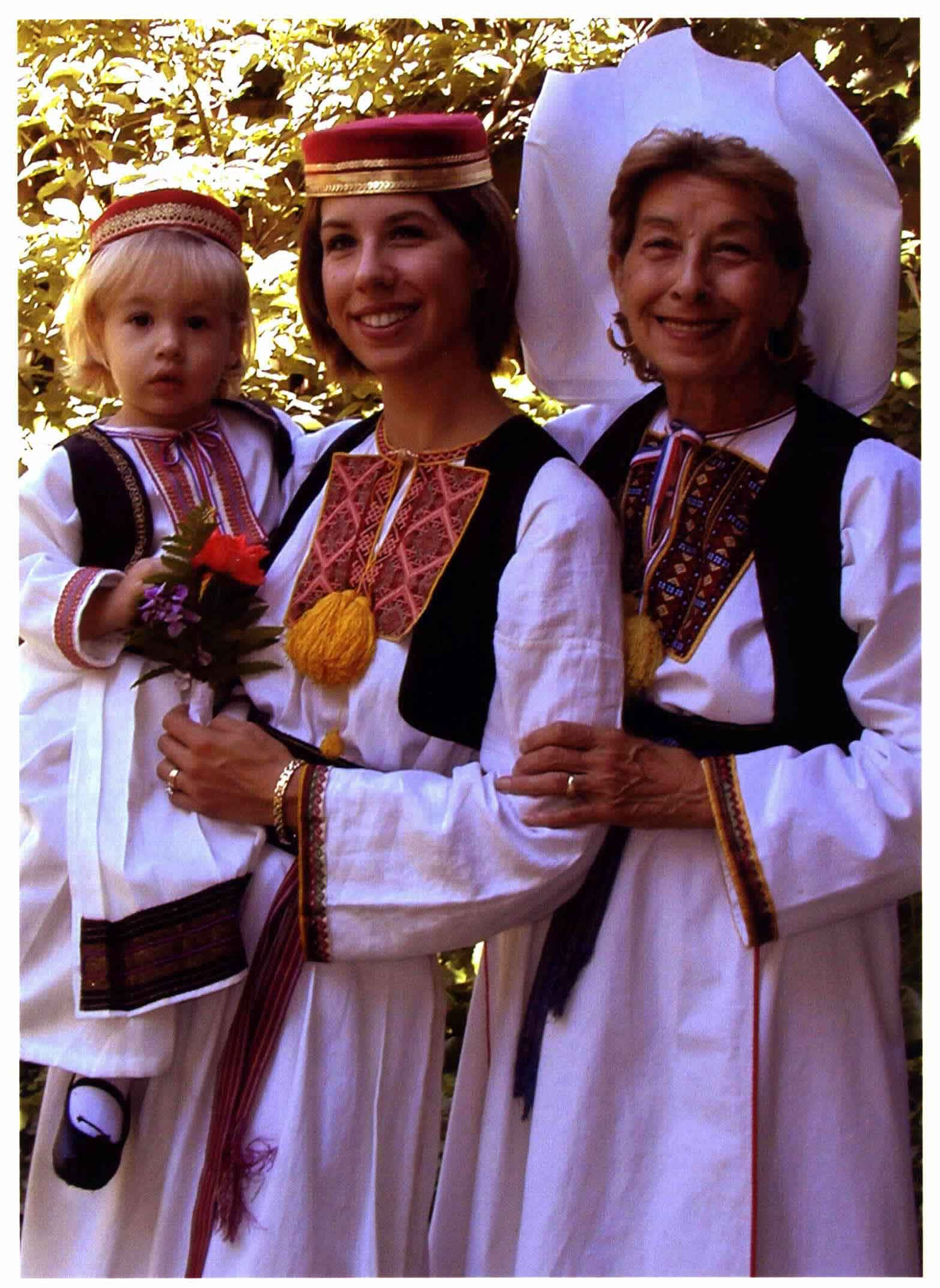 and old to enjoy and reminisce. One can feast
on hot barbecued lamb and other delicacies. Children partake in
the games, while adults can refresh themselves at the large outdoor
bar. Perhaps you would rather grab a chair to enjoy the tambura
music and watch the kolo dancers.
and old to enjoy and reminisce. One can feast
on hot barbecued lamb and other delicacies. Children partake in
the games, while adults can refresh themselves at the large outdoor
bar. Perhaps you would rather grab a chair to enjoy the tambura
music and watch the kolo dancers.
More important
then the picnic is the spiritual strength that the parishioners
of St. Jerome draw from Velika Gospa. For 9 days prior to the
feast, parishioners attend a novena to honor Our Lady of Sinj.
The culmination of the novena comes on the 15th, when participants
walk in procession with Our Lady, then partake in the celebration
of a High Mass. The parishioners, in this way, thank Mary for
all the graces they have received through her intercession to
her Divine Son.
TOP
HOME

